

Commentary Select
Commentary Select




Swindoll's Living Insights: Insights on 1&2 Timothy, Titus

Swindoll's Living Insights: Insights on 1&2 Timothy, Titus
Insights on 1 & 2 Timothy, Titus explores Paul’s Pastoral Epistles. Each volume combines verse-by-verse commentary, charts, maps, photos, key terms, and background articles with practical application and includes both the NLT and NASB translations of the Bible, verse-by-verse commentary, charts, maps, photos, key terms, and background articles with practical application. A must-have for pastors, teachers, and anyone else who is seeking a deeply practical resource for exploring God’s Word.
Swindoll's Living Insights: Insights on 1, 2 & 3 John, Jude
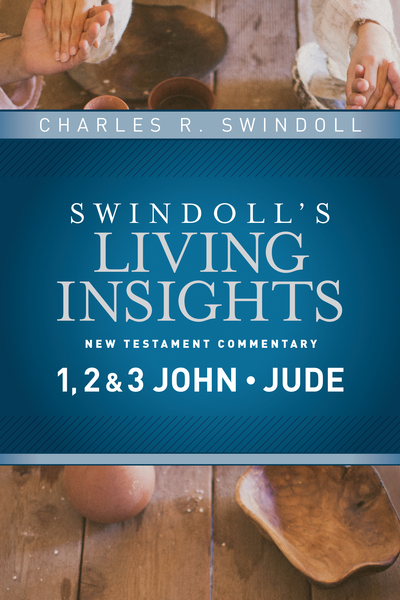
Swindoll's Living Insights: Insights on 1, 2 & 3 John, Jude
The four short letters of 1-3 John and Jude deliver powerful messages of correct living in a wrong world and are as relevant today as they were in the first century. Written near the end of the John’s life, 1 John was meant to revive the faith, love, and hope of his readers and encourage them to renew an authentic, contagious walk with Christ. Like two siblings, 2 and 3 John are letters with unique personalities but also some striking similarities, each taking a unique approach to a single, urgent message: balance unconditional love with discerning truth.
Jude, the brother of Jesus, writes with a twofold purpose: expose the false teachers that had infiltrated the Christian community, and encourage the believers to stand firm in the faith and fight for it.
The Swindoll’s Living Insights New Testament Commentary series draws on 13-time Christian Book Award winner Chuck Swindoll’s more than 50 years of studying and preaching God’s Word. Each volume includes both the NLT and NASB translations of the Bible, verse-by-verse commentary, charts, maps, photos, key terms, and background articles with practical application. A must-have for pastors, teachers, and anyone else who is seeking a deeply practical resource for exploring God’s Word.
Charles R. Swindoll is the founder and senior pastor–teacher of Stonebriar Community Church in Frisco, Texas. But Chuck's listening audience extends far beyond a local church body, as Insight for Living airs on major Christian radio markets around the world. Chuck's extensive writing ministry has also served the body of Christ worldwide, and his leadership as president and now chancellor of Dallas Theological Seminary has helped prepare and equip a new generation of men and women for ministry. Chuck and his wife, Cynthia, his partner in life and ministry, have four grown children, and seven great-grandchildren.
Swindoll's Living Insights: Insights on Acts

Swindoll's Living Insights: Insights on Acts
Insights on Acts explores the expansion of the early church throughout the Roman world. This volume draws on Gold Medallion Award–winner Chuck Swindoll’s 50 years of experience with studying and preaching God’s Word. His deep insight, signature easygoing style, and humor bring a warmth and practical accessibility not often found in commentaries.
Each volume combines verse-by-verse commentary, charts, maps, photos, key terms, and background articles with practical application. The newly updated volumes now include parallel presentations of the NLT and NASB before each section. This series is a must-have for pastors, teachers, and anyone else who is seeking a deeply practical resource for exploring God’s Word.
Swindoll's Living Insights: Insights on Galatians, Ephesians (Vol. 8)

Swindoll's Living Insights: Insights on Galatians, Ephesians (Vol. 8)
The basic message of Galatians can be summed up in three sentences: Paul had heard that the Galatian Christians were in danger of falling away from the true gospel of grace by turning to a legalistic approach to salvation and the Christian life. His passion for the truth compelled him to call them back to the freedom of salvation by grace alone through faith alone. In doing so, he argued that not only is the sinner saved by grace, but the saved sinner also lives by grace.
The Swindoll’s Living Insights New Testament Commentary draws on 13-time Christian Book Award winner Chuck Swindoll’s more than 50 years of studying and preaching God’s Word. Each volume includes both the NLT and NASB translations of the Bible, verse-by-verse commentary, charts, maps, photos, key terms, and background articles with practical application. A must-have for pastors, teachers, and anyone else who is seeking a deeply practical resource for exploring God’s Word.
Swindoll's Living Insights: Insights on Hebrews
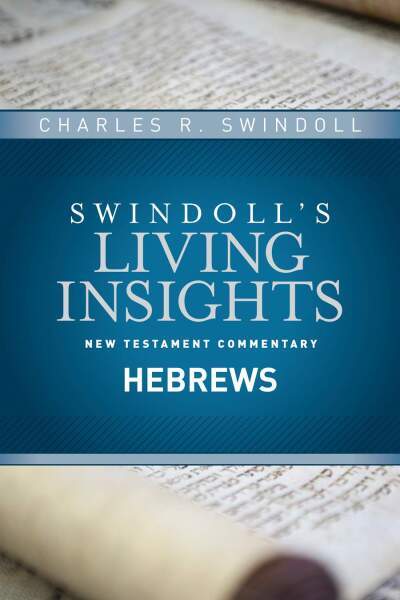
Swindoll's Living Insights: Insights on Hebrews
The letter to the Hebrews isn’t casual bedside reading. Dense and deep, complex and compelling, profound and practical— it requires mental focus and spiritual motivation to grasp its content and grapple with its application. But the return on this big investment has benefits that pay off in eternal dividends. Dive in with author Charles Swindoll and you'll soon discover that numerous ancient springs from the Old Testament contribute to its fresh message to God’s people. Rich in history, vibrant in imagery, and eloquent in style, the book of Hebrews has the words to refresh our minds and cleanse our souls.
The Swindoll’s Living Insights New Testament Commentary draws on 13-time Christian Book Award winner Chuck Swindoll’s more than 50 years of studying and preaching God’s Word. Each volume includes both the NLT and NASB translations of the Bible, verse-by-verse commentary, charts, maps, photos, key terms, and background articles with practical application. A must-have for pastors, teachers, and anyone else who is seeking a deeply practical resource for exploring God’s Word.
Charles R. Swindoll is the founder and senior pastor–teacher of Stonebriar Community Church in Frisco, Texas. But Chuck's listening audience extends far beyond a local church body, as Insight for Living airs on major Christian radio markets around the world. Chuck's extensive writing ministry has also served the body of Christ worldwide, and his leadership as president and now chancellor of Dallas Theological Seminary has helped prepare and equip a new generation of men and women for ministry. Chuck and his wife, Cynthia, his partner in life and ministry, have four grown children, and seven great-grandchildren.
Swindoll's Living Insights: Insights on James, 1&2 Peter

Swindoll's Living Insights: Insights on James, 1&2 Peter
This newly revised and expanded edition of Insights on James, 1 & 2 Peter combines verse-by-verse commentary, charts, maps, photos, key terms, and background articles with practical application. The newly updated volumes now include parallel presentations of the NLT and NASB before each section. This series is a must-have for pastors, teachers, and anyone else who is seeking a deeply practical resource for exploring God’s Word.
Swindoll's Living Insights: Insights on John

Swindoll's Living Insights: Insights on John
Insights on John combines verse-by-verse commentary, charts, maps, photos, key terms, and background articles with practical application. The newly updated volumes now include parallel presentations of the NLT and NASB before each section. This series is a must-have for pastors, teachers, and anyone else who is seeking a deeply practical resource for exploring God’s Word.
Swindoll's Living Insights: Insights on Luke
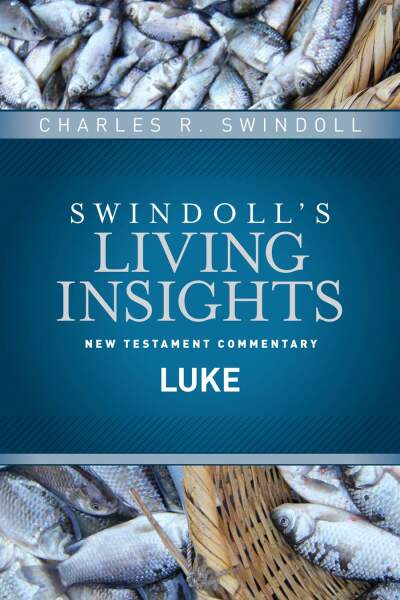
Swindoll's Living Insights: Insights on Luke
Join Chuck as he explores Dr. Luke’s carefully researched and strikingly human account of the life of Jesus. Luke describes the man, Jesus, and His ministry in vivid detail. He shows that Jesus is the perfect God-man, the all-powerful Creator who became human to save all of humanity, Jew and Gentile alike.
The Swindoll’s Living Insights New Testament Commentary series draws on 13-time Christian Book Award winner Chuck Swindoll’s more than 50 years of studying and preaching God’s Word. Each volume includes both the NLT and NASB translations of the Bible, verse-by-verse commentary, charts, maps, photos, key terms, and background articles with practical application. A must-have for pastors, teachers, and anyone else who is seeking a deeply practical resource for exploring God’s Word.
Charles R. Swindoll is the founder and senior pastor–teacher of Stonebriar Community Church in Frisco, Texas. But Chuck's listening audience extends far beyond a local church body, as Insight for Living airs on major Christian radio markets around the world. Chuck's extensive writing ministry has also served the body of Christ worldwide, and his leadership as president and now chancellor of Dallas Theological Seminary has helped prepare and equip a new generation of men and women for ministry. Chuck and his wife, Cynthia, his partner in life and ministry, have four grown children, and seven great-grandchildren.
Swindoll's Living Insights: Insights on Mark
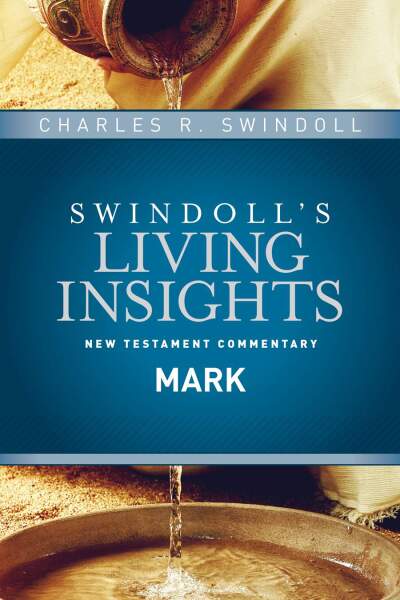
Swindoll's Living Insights: Insights on Mark
Mark’s Gospel is fast-paced and action-packed. In this volume, Chuck unpacks both Jesus’ story and how Mark wants his readers to see themselves in this story. From beginning to end, you will see the Master preparing His disciples and then propelling them forward to encounter challenges they felt ill-prepared to meet.
The Swindoll’s Living Insights New Testament Commentary series draws on 13-time Christian Book Award winner Chuck Swindoll’s more than 50 years of studying and preaching God’s Word. Each volume includes both the NLT and NASB translations of the Bible, verse-by-verse commentary, charts, maps, photos, key terms, and background articles with practical application. A must-have for pastors, teachers, and anyone else who is seeking a deeply practical resource for exploring God’s Word.
Charles R. Swindoll is the founder and senior pastor–teacher of Stonebriar Community Church in Frisco, Texas. But Chuck's listening audience extends far beyond a local church body, as Insight for Living airs on major Christian radio markets around the world. Chuck's extensive writing ministry has also served the body of Christ worldwide, and his leadership as president and now chancellor of Dallas Theological Seminary has helped prepare and equip a new generation of men and women for ministry. Chuck and his wife, Cynthia, his partner in life and ministry, have four grown children, and seven great-grandchildren.
Swindoll's Living Insights: Insights on Matthew 1-15
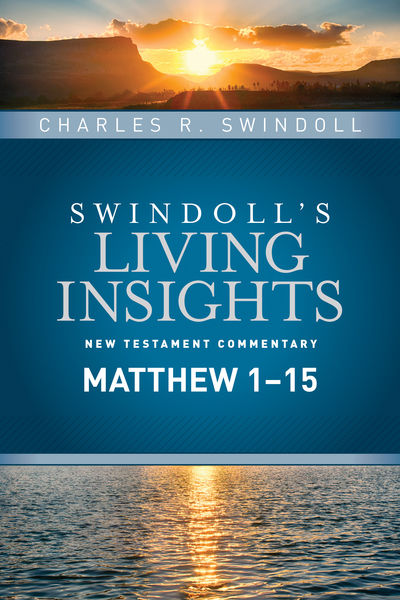
Swindoll's Living Insights: Insights on Matthew 1-15
Matthew’s Gospel shows that Jesus was Israel’s king and long-awaited Messiah. In Insights on Matthew 1–15, Chuck Swindoll explores the announcement, arrival, proclamation, and reception of the king. Chuck’s deep insight, signature easygoing style, and humor bring a warmth and practical accessibility not often found in commentaries.
The Swindoll’s Living Insights New Testament Commentary series draws on 13-time Christian Book Award winner Chuck Swindoll’s more than 50 years of studying and preaching God’s Word. Each volume includes both the NLT and NASB translations of the Bible, verse-by-verse commentary, charts, maps, photos, key terms, and background articles with practical application. A must-have for pastors, teachers, and anyone else who is seeking a deeply practical resource for exploring God’s Word.
Charles R. Swindoll is the founder and senior pastor–teacher of Stonebriar Community Church in Frisco, Texas. But Chuck's listening audience extends far beyond a local church body, as Insight for Living airs on major Christian radio markets around the world. Chuck's extensive writing ministry has also served the body of Christ worldwide, and his leadership as president and now chancellor of Dallas Theological Seminary has helped prepare and equip a new generation of men and women for ministry. Chuck and his wife, Cynthia, his partner in life and ministry, have four grown children, and seven great-grandchildren.
Swindoll's Living Insights: Insights on Matthew 16-28
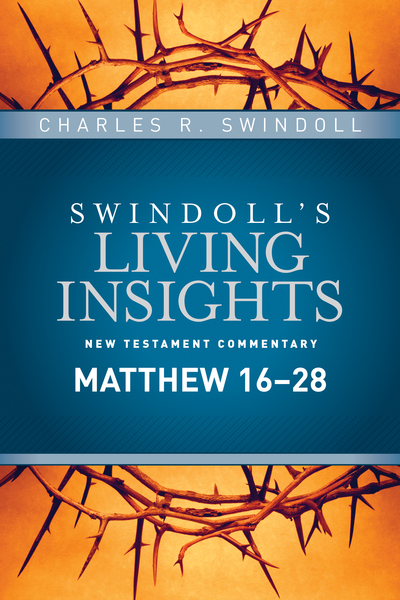
Swindoll's Living Insights: Insights on Matthew 16-28
Matthew’s Gospel shows that Jesus was Israel’s King and long-awaited Messiah. In Insights on Matthew 16–28, Chuck Swindoll unpacks the journey of Jesus from His transfiguration to His glorious resurrection. Chuck’s deep insight, signature easygoing style, and humor bring a warmth and practical accessibility not often found in commentaries.
The Swindoll’s Living Insights New Testament Commentary series draws on 13-time Christian Book Award winner Chuck Swindoll’s more than 50 years of studying and preaching God’s Word. Each volume includes both the NLT and NASB translations of the Bible, verse-by-verse commentary, charts, maps, photos, key terms, and background articles with practical application. A must-have for pastors, teachers, and anyone else who is seeking a deeply practical resource for exploring God’s Word.
Charles R. Swindoll is the founder and senior pastor–teacher of Stonebriar Community Church in Frisco, Texas. But Chuck's listening audience extends far beyond a local church body, as Insight for Living airs on major Christian radio markets around the world. Chuck's extensive writing ministry has also served the body of Christ worldwide, and his leadership as president and now chancellor of Dallas Theological Seminary has helped prepare and equip a new generation of men and women for ministry. Chuck and his wife, Cynthia, his partner in life and ministry, have four grown children, and seven great-grandchildren.
Swindoll's Living Insights: Insights on Philippians, Colossians, Philemon
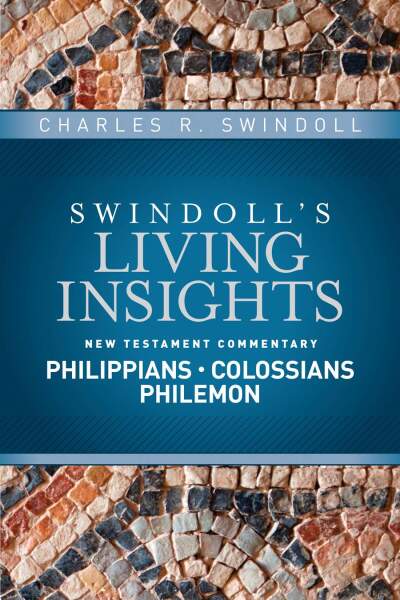
Swindoll's Living Insights: Insights on Philippians, Colossians, Philemon
Philippians is saturated with joy. While under house arrest in Rome, Paul wrote to encourage the Philippians to rejoice in the Lord, despite their circumstances—to find Christ-centered, Spirit-empowered joy in living, serving, sharing, and resting.
Colossians is addressed to a church suffering from cultural capitulation and spiritual surrender—just like the church of the twenty-first century. Those who deceive others with self-centered philosophies, self-promoting legalism, and self-serving asceticism attract power and attention, while diminishing the gospel of Jesus Christ. Colossians serves as a lighthouse piercing the fog of false teaching and leading us to the safe harbor of Christ.
Philemon illustrates the importance of second chances, the equality of believers in Christ, and the power of the gospel to transcend cultural and social boundaries. It reminds us of the Christ-centered concepts of freedom, forgiveness, mercy, and especially grace.
The Swindoll’s Living Insights New Testament Commentary series draws on 13-time Christian Book Award winner Chuck Swindoll’s more than 50 years of studying and preaching God’s Word. Each volume includes both the NLT and NASB translations of the Bible, verse-by-verse commentary, charts, maps, photos, key terms, and background articles with practical application. A must-have for pastors, teachers, and anyone else who is seeking a deeply practical resource for exploring God’s Word.
Charles R. Swindoll is the founder and senior pastor–teacher of Stonebriar Community Church in Frisco, Texas. But Chuck's listening audience extends far beyond a local church body, as Insight for Living airs on major Christian radio markets around the world. Chuck's extensive writing ministry has also served the body of Christ worldwide, and his leadership as president and now chancellor of Dallas Theological Seminary has helped prepare and equip a new generation of men and women for ministry. Chuck and his wife, Cynthia, his partner in life and ministry, have four grown children, and seven great-grandchildren.
Swindoll's Living Insights: Insights on Revelation

Swindoll's Living Insights: Insights on Revelation
This newly revised and expanded edition of Insights on Revelation explores one of the most perplexing books in Scripture.
The Swindoll’s Living Insights New Testament Commentary draws on 13-time Christian Book Award winner Chuck Swindoll’s more than 50 years of studying and preaching God’s Word. Each volume includes both the NLT and NASB translations of the Bible, verse-by-verse commentary, charts, maps, photos, key terms, and background articles with practical application. A must-have for pastors, teachers, and anyone else who is seeking a deeply practical resource for exploring God’s Word.
Swindoll's Living Insights: Insights on Romans
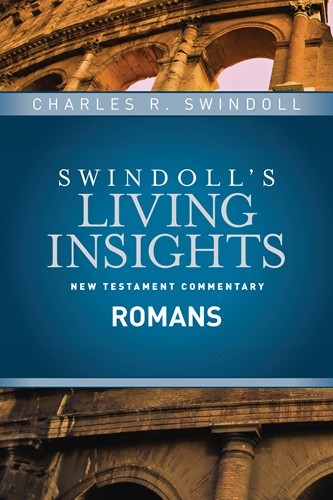
Swindoll's Living Insights: Insights on Romans
Teaching 1 Kings: Teaching the Bible Series
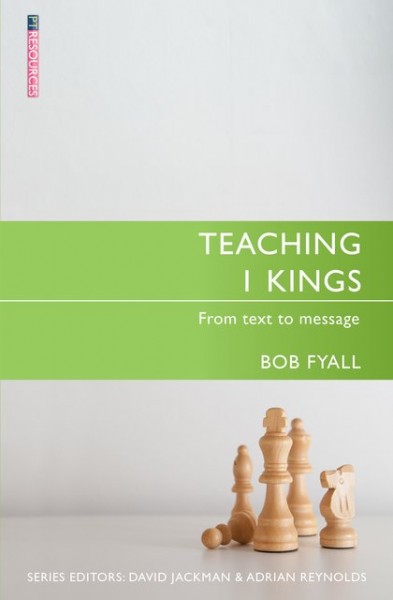
Teaching 1 Kings: Teaching the Bible Series
The Teaching the Bible series is designed to help the pastor/preacher, a small group leader or a youth worker teach their way through a Biblical book. It will help you in planning and executing a lesson advising on background, structure, key points and application. They are all geared to teach you the truth of Scripture. This series is published in conjunction with Proclamation Trust Media whose aim is to encourage ministry that seeks above all to expound the Bible as God’s Word for today.
Bob Fyall is Senior Tutor in Ministry for the Cornhill Training Course (Scotland). Prior to that he was the Director of Rutherford House, Edinburgh. He is an experienced pastor, preacher and Old Testament scholar.
Teaching 1 Peter: Teaching the Bible Series
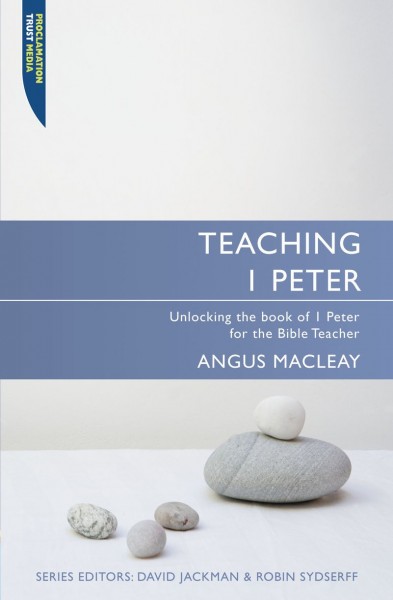
Teaching 1 Peter: Teaching the Bible Series
The Teaching the Bible series is designed to help the pastor/preacher, a small group leader or a youth worker teach their way through a Biblical book. It will help you in planning and executing a lesson advising on background, structure, key points and application. They are all geared to teach you the truth of Scripture. This series is published in conjunction with Proclamation Trust Media whose aim is to encourage ministry that seeks above all to expound the Bible as God’s Word for today.
Angus MacLeay is the Rector of St. Nicholas, a large Anglican Church in Sevenoaks, and is also a member of the Church of England General Synod. One of St. Nicholas' previous ministers was the poet, John Donne. The recent story of the church is told by the book The Church That Went Under.
Teaching 1 Timothy: Teaching the Bible Series
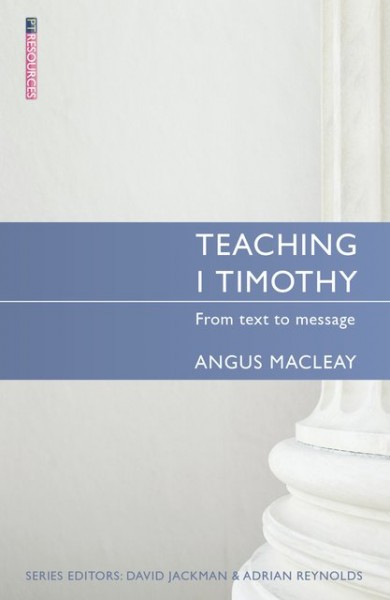
Teaching 1 Timothy: Teaching the Bible Series
The Teaching the Bible series is designed to help the pastor/preacher, a small group leader or a youth worker teach their way through a Biblical book. It will help you in planning and executing a lesson advising on background, structure, key points and application. They are all geared to teach you the truth of Scripture. This series is published in conjunction with Proclamation Trust Media whose aim is to encourage ministry that seeks above all to expound the Bible as God’s Word for today.
Angus MacLeay is the Rector of St. Nicholas, a large Anglican Church in Sevenoaks, and is also a member of the Church of England General Synod. One of St. Nicholas' previous ministers was the poet, John Donne. The recent story of the church is told by the book The Church that went under.
Teaching 1-3 John: Teaching the Bible Series
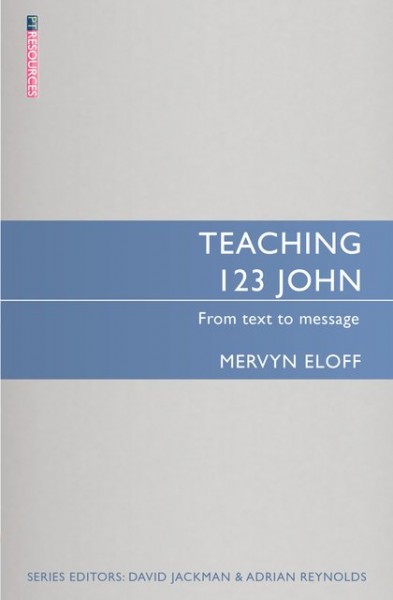
Teaching 1-3 John: Teaching the Bible Series
The Teaching the Bible series is designed to help the pastor/preacher, a small group leader or a youth worker teach their way through a Biblical book. It will help you in planning and executing a lesson advising on background, structure, key points and application. They are all geared to teach you the truth of Scripture. This series is published in conjunction with Proclamation Trust Media whose aim is to encourage ministry that seeks above all to expound the Bible as God’s Word for today.
Mervyn Eloff is Rector of St James Church, Kenilworth, South Africa.
Teaching 2 Timothy: Teaching the Bible Series
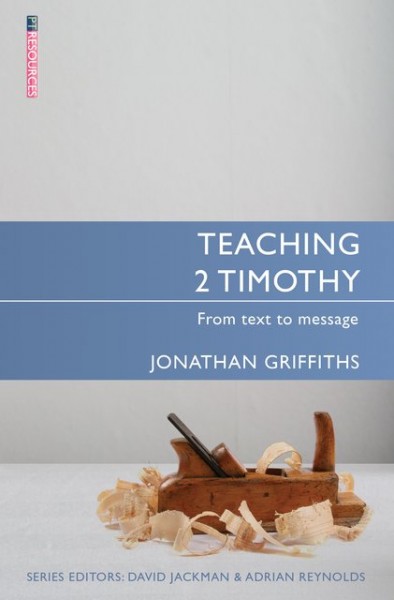
Teaching 2 Timothy: Teaching the Bible Series
The Teaching the Bible series is designed to help the pastor/preacher, a small group leader or a youth worker teach their way through a Biblical book. It will help you in planning and executing a lesson advising on background, structure, key points and application. They are all geared to teach you the truth of Scripture. This series is published in conjunction with Proclamation Trust Media whose aim is to encourage ministry that seeks above all to expound the Bible as God’s Word for today.
Jonathan Griffiths serves as Lead Pastor of The Met in Ottawa, Canada. He previously served on the staff of the Proclamation Trust in London, UK. He lives with his wife, Gemma, and their three children on the south side of Ottawa.
Teaching Acts: Teaching the Bible Series
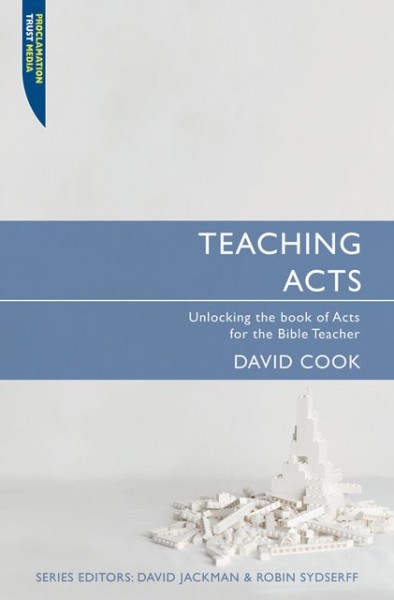
Teaching Acts: Teaching the Bible Series
The Teaching the Bible series is designed to help the pastor/preacher, a small group leader or a youth worker teach their way through a Biblical book. It will help you in planning and executing a lesson advising on background, structure, key points and application. They are all geared to teach you the truth of Scripture. This series is published in conjunction with Proclamation Trust Media whose aim is to encourage ministry that seeks above all to expound the Bible as God’s Word for today.
David Cook has recently retired from his role as Principal and Director of the School of Preaching at Sydney Missionary and Bible College (SMBC). He is now now involved in an itinerant preaching and teaching ministry, He is a Presbyterian minister and a graduate of SMBC and Moore Theological College. Prior to formal studies and pastoral ministry David worked in the Economic Research Department of the Reserve Bank. He has spoken at a number of Christian Conventions including Keswick. David is married to Maxine, and they have five adult children and eight grandchildren.
Teaching Amos: Teaching the Bible Series
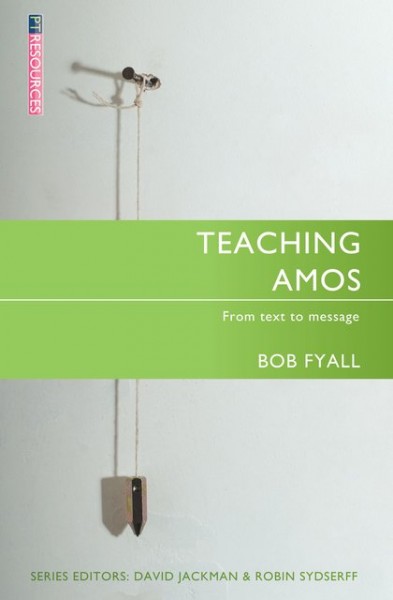
Teaching Amos: Teaching the Bible Series
'Teaching Amos' is written by Dr Bob Fyall, who has a particular passion for preaching and teaching the Old Testament. He is author of a number of books, including the Focus on the Bible volume on Daniel.
Having first outlined a number of possible approaches to constructing a series of sermons or talks on Amos, Bob unlocks the text based on a suggested structure of nine sermons or talks. Individual chapters are specifically geared towards working from text to sermon, combining rigorous exposition with relevant application, always with an eye to the main teaching point of the passage. This volume will not only encourage better preaching on Amos, but serve as a timely reminder of the striking relevance of the prophet's message for today.
Bob Fyall is Senior Tutor in Ministry for the Cornhill Training Course (Scotland). Prior to that he was the Director of Rutherford House, Edinburgh. He is an experienced pastor, preacher and Old Testament scholar.
Teaching Daniel: Teaching the Bible Series
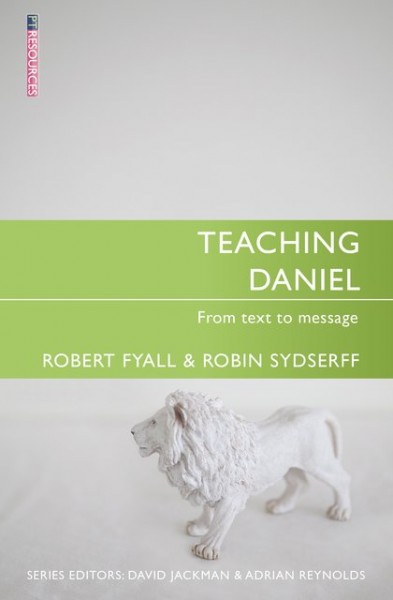
Teaching Daniel: Teaching the Bible Series
This useful resource, alongside the others in this growing Teaching the Bible Series, is for those who have the privilege and joy of teaching or preaching a particular book or theme from the Bible. Whether you're a leader of a small group, preacher or a youth worker, it will help you to communicate the message of Daniel.
The Teaching the Bible series is designed to help the pastor/preacher, a small group leader or a youth worker teach their way through a Biblical book. It will help you in planning and executing a lesson advising on background, structure, key points and application. They are all geared to teach you the truth of Scripture. This series is published in conjunction with Proclamation Trust Media whose aim is to encourage ministry that seeks above all to expound the Bible as God’s Word for today.
Robin Sydserff is the minister of Chalmers Church, Edinburgh, having previously served as Director of Ministry for Cornhill. Bob Fyall is Senior Tutor in Ministry for the Cornhill Training Course (Scotland). Prior to that he was the Director of Rutherford House, Edinburgh. He is an experienced pastor, preacher and Old Testament scholar.
Teaching Ephesians: Teaching the Bible Series
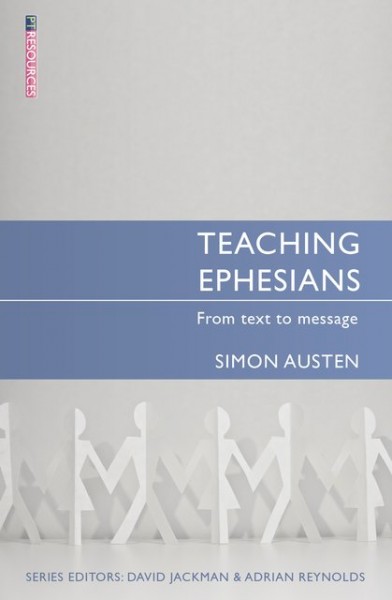
Teaching Ephesians: Teaching the Bible Series
"A closely argued, warmly applied letter from the heart of the Apostle to the Gentiles, reflected in Simon's careful analysis for the Bible preacher or teacher. His love of the book and understanding of its relevance for today comes through clearly in this important contribution to the Teaching the Bible series." David Jackman & Adrian Reynolds, series editors
The Teaching the Bible series is designed to help the pastor/preacher, a small group leader or a youth worker teach their way through a Biblical book. It will help you in planning and executing a lesson advising on background, structure, key points and application. They are all geared to teach you the truth of Scripture. This series is published in conjunction with Proclamation Trust Media whose aim is to encourage ministry that seeks above all to expound the Bible as God’s Word for today.
Simon Austen has degrees in Science and Theology. A previous chaplain of Stowe School, he is now Rector at St Leonard's in Exeter in England.
Teaching Ezra: Teaching the Bible Series
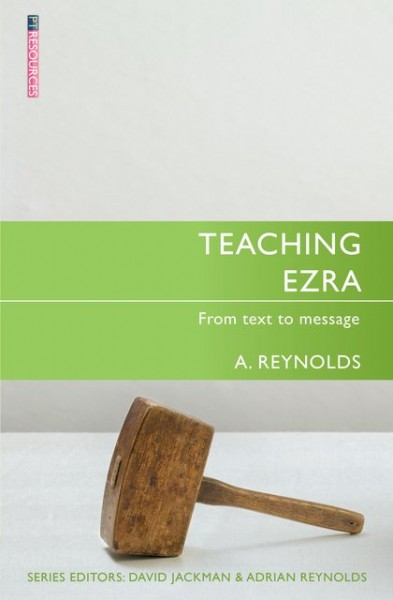
Teaching Ezra: Teaching the Bible Series
The Teaching the Bible series is designed to help the pastor/preacher, a small group leader or a youth worker teach their way through a Biblical book. It will help you in planning and executing a lesson advising on background, structure, key points and application. They are all geared to teach you the truth of Scripture. This series is published in conjunction with Proclamation Trust Media whose aim is to encourage ministry that seeks above all to expound the Bible as God’s Word for today.
Adrian Reynolds is Director of Ministry of the Proclamation Trust and also serves as associate minister at East London Tabernacle Baptist Church, London
Teaching Isaiah: Teaching the Bible Series
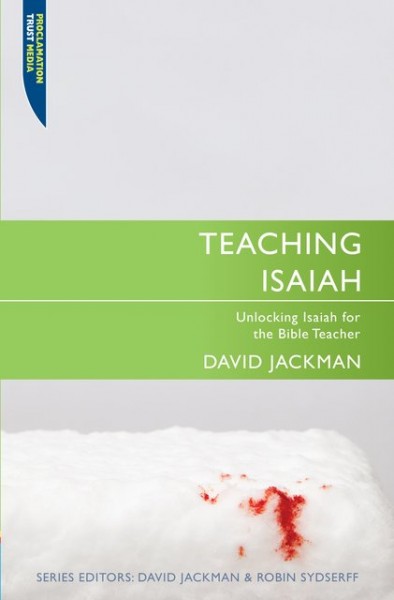
Teaching Isaiah: Teaching the Bible Series
In the period that Isaiah the prophet lived there was immense political upheaval across the ancient near-east. The people of God had a choice - to follow their own human policies or to follow the promises of God. They chose to be unfaithful. The prophet breaks in and calls them to repent asking them to stop violating the covenant.
In today's setting this is a message that your hearers will identify with, readily identifying ourselves with the deceitful hearts of the people of Judah, and learn also from their mistakes how our own divided hearts may equally lead us astray.
This is not another commentary but a useful resource, which will help the pastor/ preacher, a small group leader or a youth worker communicate a message of grace when speaking from the book of Isaiah. It will give you help in planning and executing a lesson in particular with background, structure, key points and application.
The Teaching the Bible series is designed to help the pastor/preacher, a small group leader or a youth worker teach their way through a Biblical book. It will help you in planning and executing a lesson advising on background, structure, key points and application. They are all geared to teach you the truth of Scripture. This series is published in conjunction with Proclamation Trust Media whose aim is to encourage ministry that seeks above all to expound the Bible as God’s Word for today.
David Jackman was the President of the Proclamation Trust & was the founder-Director of the Cornhill Training Course, London. Currently he teaches part-time on the Cornhill course as well as engaging a world wide ministry for Proclamation Trust. Proclamation Trust's aim is to effectively communicate the gospel, especially through preaching. Previously he was the minister of Above Bar Church, Southampton.
Teaching John: Teaching the Bible Series
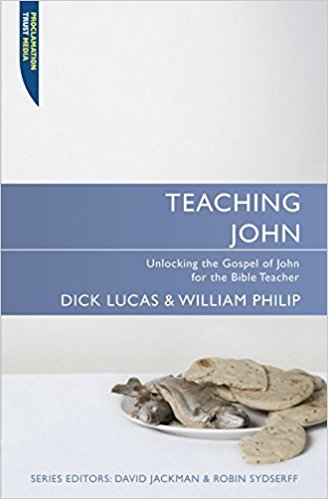
Teaching John: Teaching the Bible Series
The purpose that John gives for writing his gospel is found in chapter 20. It is this key that is then used to unlock 4 very famous chapters in the book.
Many commentaries are written on John but very few take into account the needs of the preacher and congregation combined. This book aims to provide the missing ingredient that will help congregations and preachers come together with the sermon as the point of contact.
The Teaching the Bible series is designed to help the pastor/preacher, a small group leader or a youth worker teach their way through a Biblical book. It will help you in planning and executing a lesson advising on background, structure, key points and application. They are all geared to teach you the truth of Scripture. This series is published in conjunction with Proclamation Trust Media whose aim is to encourage ministry that seeks above all to expound the Bible as God’s Word for today.
Teaching Matthew: Teaching the Bible Series
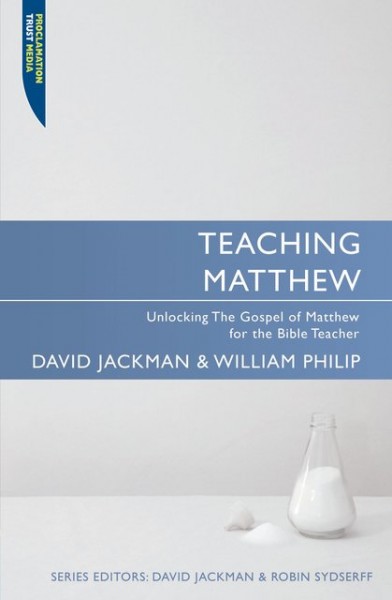
Teaching Matthew: Teaching the Bible Series
It also excels as a way of explaining the message of the New Testament gospel emphasising a sense of its continuity with the whole Old Testament, and the fulfilment of God's covenant promises in Jesus Christ. This is not an exhaustive exposition of the Gospel. The major focus is on Matthew's five great teaching sections. It is not intended to take the place of commentaries but complement them, as few commentaries seem to be written with the sermon (or Bible exposition) as the point of reference that is being worked towards.
As we work through Matthew's Gospel, then, the aim is to help the Bible teacher find a way into the text that will enable him to use it for its given purpose: to be proclaimed as the living word of God. That is the point of Scripture, what it is meant for.
The Teaching the Bible series is designed to help the pastor/preacher, a small group leader or a youth worker teach their way through a Biblical book. It will help you in planning and executing a lesson advising on background, structure, key points and application. They are all geared to teach you the truth of Scripture. This series is published in conjunction with Proclamation Trust Media whose aim is to encourage ministry that seeks above all to expound the Bible as God’s Word for today.
David Jackman was the President of the Proclamation Trust & was the founder-Director of the Cornhill Training Course, London. Currently he teaches part-time on the Cornhill course as well as engaging a world wide ministry for Proclamation Trust. Proclamation Trust's aim is to effectively communicate the gospel, especially through preaching. Previously he was the minister of Above Bar Church, Southampton.
Teaching Numbers: Teaching the Bible Series
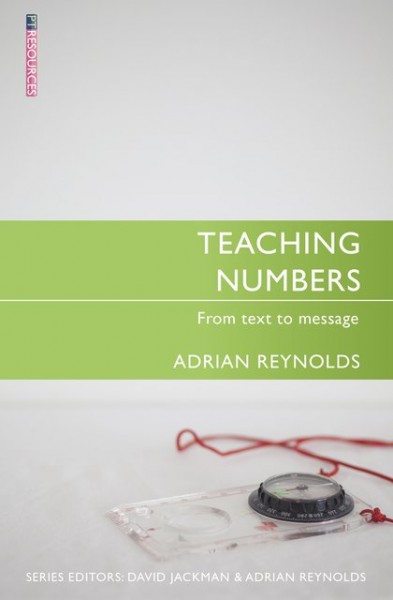
Teaching Numbers: Teaching the Bible Series
The Book of Numbers follows the journey of the Israelite people from the Exodus from Egypt until their entrance into the Promised Land. This book is deeply relevant for a wandering generation today who need to make their way back to God. The book points to Christ and provides important instruction for believers today. Discover how God speaks even in the wilderness!
The Teaching the Bible series is designed to help the pastor/preacher, a small group leader or a youth worker teach their way through a Biblical book. It will help you in planning and executing a lesson advising on background, structure, key points and application. They are all geared to teach you the truth of Scripture. This series is published in conjunction with Proclamation Trust Media whose aim is to encourage ministry that seeks above all to expound the Bible as God’s Word for today.
Adrian Reynolds is Director of Ministry of the Proclamation Trust and also serves as associate minister at East London Tabernacle Baptist Church, London
Teaching Psalms Volume 1: Teaching the Bible Series
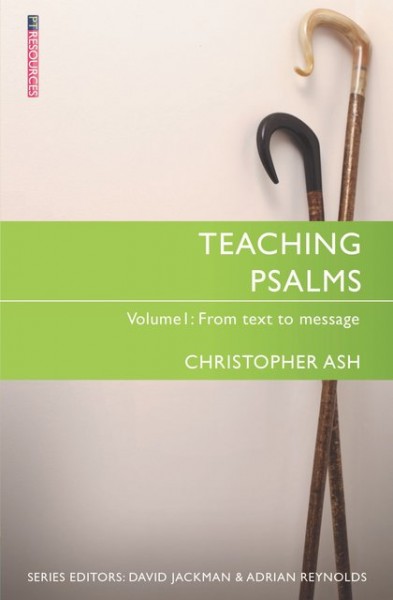
Teaching Psalms Volume 1: Teaching the Bible Series
The Teaching the Bible series is designed to help the pastor/preacher, a small group leader or a youth worker teach their way through a Biblical book. It will help you in planning and executing a lesson advising on background, structure, key points and application. They are all geared to teach you the truth of Scripture. This series is published in conjunction with Proclamation Trust Media whose aim is to encourage ministry that seeks above all to expound the Bible as God’s Word for today.
Christopher Ash is Writer–in–Residence at Tyndale House and Ministry Trainer at St. Andrew the Great church in Cambridge. From 2004 to 2015 he was Director of the Proclamation Trust Cornhill Training Course. He splits his time between preaching, speaking and writing, and has written several books, including ‘Bible Delight: Psalm 119 for the Bible teacher and Bible hearer’ and ‘Teaching Psalms Vol. 1’.
Teaching Psalms Volume 2: Teaching the Bible Series
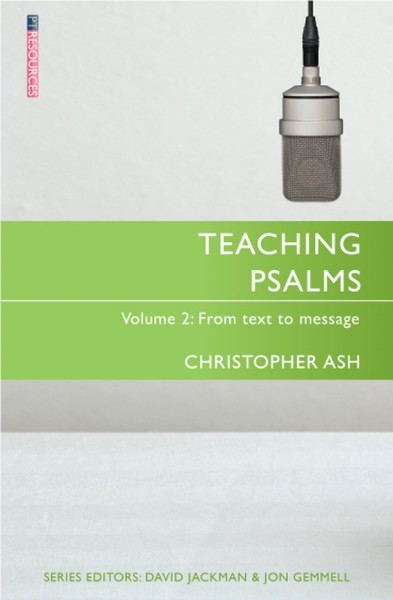
Teaching Psalms Volume 2: Teaching the Bible Series
The Psalms can be sung, spoken or read – but they were written to be prayed. Until we pray them from the heart we miss their purpose. The two volumes of Teaching Psalms aim to get the reader’s heart engaging with this beautiful book of the Bible. If you love, or want to love, or think perhaps you ought to love the Psalms, these volumes are for you.
Volume 1 acts as a handbook:
- How to pray the Psalms
- How to teach the Psalms
- The difficulties we face in the Psalms
- Integrating the Psalms into the Bible story
Christopher Ash is Writer–in–Residence at Tyndale House and Ministry Trainer at St. Andrew the Great church in Cambridge. From 2004 to 2015 he was Director of the Proclamation Trust Cornhill Training Course. He splits his time between preaching, speaking and writing, and has written several books, including ‘Bible Delight: Psalm 119 for the Bible teacher and Bible hearer’ and ‘Teaching Psalms Vol. 1’.






- Adapt your commentary collection month-to-month based on the book or books you are studying.
- Build your commentary library strategically without hundreds of dollars of upfront investment.
- Never get stuck with commentaries you rarely use - swap them out each month as your needs change.



